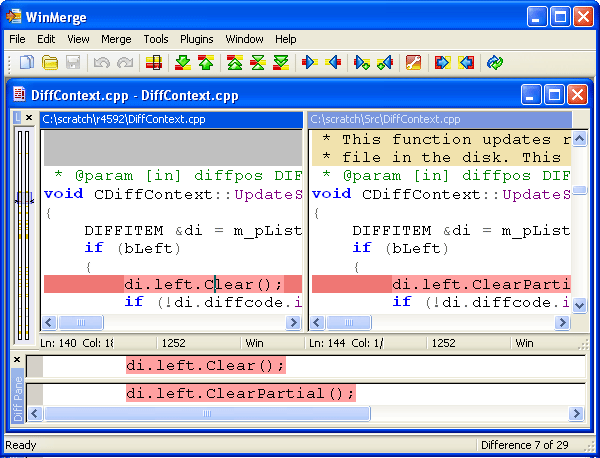

- #FILE COMPARE AND MERGE TOOL FREE DOWNLOAD HOW TO#
- #FILE COMPARE AND MERGE TOOL FREE DOWNLOAD INSTALL#
- #FILE COMPARE AND MERGE TOOL FREE DOWNLOAD UPDATE#
- #FILE COMPARE AND MERGE TOOL FREE DOWNLOAD CODE#
One limitation of XXdiff is its lack of support for unicode files and inline editing of diff files. XXdiff is a free, powerful file and directory comparator and merge tool that runs on Unix like operating systems such as Linux, Solaris, HP/UX, IRIX, DEC Tru64.
#FILE COMPARE AND MERGE TOOL FREE DOWNLOAD UPDATE#
#FILE COMPARE AND MERGE TOOL FREE DOWNLOAD HOW TO#
Use wdiff manual for how to use it on Linux.
#FILE COMPARE AND MERGE TOOL FREE DOWNLOAD INSTALL#
To install wdiff on your Linux systems, run: # yum install wdiff This program is very useful when comparing two texts for changed words and for which paragraphs have been refilled. The wdiff utility is a front end to diff command used to compare files on a word by word basis. Linux Colordiff Command – Color diff Output wdiff Command You can check out the manual entry for Colordiff as shown.

You can install Colordiff on your Linux systems, using default package manager tools called yum, dnf or apt-get as shown. There are some wrappers for the diff tool that enhance its functionality and these include: colordiff CommandĬolordiff is a Perl script that produces same output as diff, but with color and syntax highlighting.

You can check out the manual entry for diff to easily use it. It compares files line by line and outputs the difference between them. Diff is simple and easy to use, it comes pre-installed on most Linux distributions. I like to start with the original Unix command-line tool that shows you the difference between two computer files.
#FILE COMPARE AND MERGE TOOL FREE DOWNLOAD CODE#
There are several file comparison tools that you can use on Linux, and in this review, we shall look at some of the best terminal based and GUI diff tools you can take advantage of while writing code or other text files. 9 Best Linux File Diff or Comparison Tools This description was born out of a reference to the output of diff, the well known Unix command-line file comparison utility. When you compare two computer files on Linux, the difference between their contents is called a diff. While writing program files or normal text files, programmers and writers sometimes want to know the difference between two files or two versions of the same file.


 0 kommentar(er)
0 kommentar(er)
